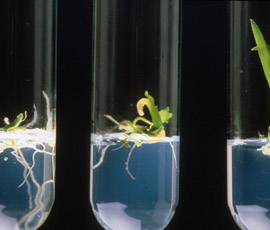GMs benefit farmers and consumers, says report

GM crops have delivered economic benefits for farmers, consumers and the environment since the technology was introduced 16 years ago, according to a new report.
The study, by UK firm PG Economics, found that GM insect-resistant crops have delivered higher incomes through improved yields in all countries where biotech crops are grown.
Since the introduction of GM crops in the mid-1990s, many farmers, especially in developing countries, have also benefitted from lower costs of production through less expenditure on pesticides.
However the report warns that over-reliance on the use of glyphosate weedkiller has contributed to the development of weed resistance and so-called “superweeds”.
As a result, farmers are increasingly adopting a “mix of reactive and proactive weed management strategies incorporating a mix of herbicides”.
“The reduction in pesticide spraying and the switch to no till cropping systems is continuing to reduce greenhouse gas emissions from agriculture.”
Graham Brookes, director of PG Economics
Although this has added to the cost of GM herbicide tolerant technology, compared to conventional crop technology, GM crops continued to offer important economic benefits in 2009, the report concluded.
The report, GM crops: global socio-economic and environmental impacts 1996-2011, found that:
- The net economic benefit at the farm level in 2011 was $19.8bn (£12.75bn)
- For the 16-year period (1996-2011), the global farm income gain was $98.2bn (£63bn)
- Of the total farm income benefit, 49% ($48/£31bn) was due to yield gains resulting from lower pest and weed pressure and improved genetics
- Average yield gains over the 16-year period were 10.1% for insect-resistant maize and 15.8% for insect-resistant cotton
- A majority (51%) of the 2011 farm income gains went to farmers in developing countries, 90% of which are resource poor and small farms.
- Between 1996 and 2011, crop biotechnology was responsible for an additional 110 m tonnes of soya beans and 195m tonnes of corn.
- Without crop biotechnology, maintaining global production at the 2011 levels would have required an additional 5.4m ha of soya beans, 6.6m ha of maize, 3.3m ha of cotton and 200,000ha of oilseed rape
- Crop biotechnology has contributed to the reduction of greenhouse gas emissions from agriculture by reducing fuel use and additional soil carbon storage from reduced tillage
- Crop biotechnology has reduced pesticide spraying by 474m kg (-9%)
Graham Brookes, director of PG Economics and co-author of the report, said: “Where farmers have been given the choice of growing GM crops, adoption levels have typically been rapid. Why? The economic benefits farmers realise are clear and amounted to an average of over $130/hectare (£84/ha) in 2011.
“The majority of these benefits continue to increasingly go to farmers in developing countries. The environment is also benefiting as farmers increasingly adopt conservation tillage practices, build their weed management practices around more benign herbicides and replace insecticide use with insect resistant GM crops.
“The reduction in pesticide spraying and the switch to no till cropping systems is continuing to reduce greenhouse gas emissions from agriculture.”
US biotech company Monsanto provided funding towards the research. However, PG Economics, a consulting firm based in Dorchester, Dorset, said the report was compiled independently and without influence from funding sponsors.
DEFRA secretary Owen Paterson believes British farmers should be allowed to grow GM crops commercially, despite continued resistance in Europe against the technology. Mr Paterson has described opponents to the technology as “humbugs”.
However, he may have a job convincing the British public. A recent survey by the Food Standards Agency found that two out of three shoppers polled said it was “important” that GM ingredients are labeled on food.
REACTION: Tesco drops non-GM for poultry
Keep up with the latest news on GM crops

